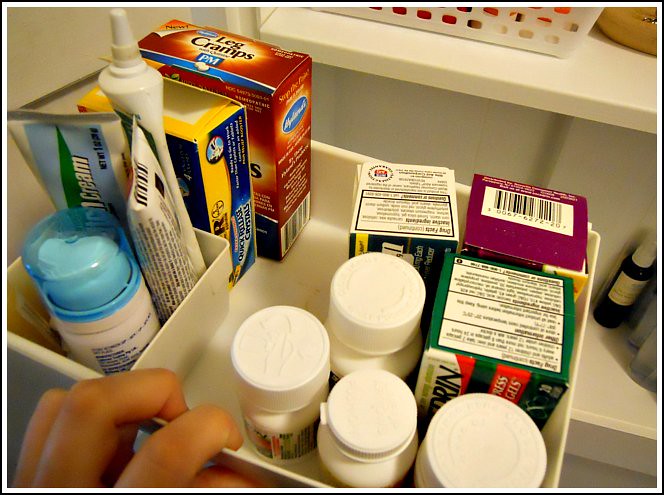
We’re coming up on cold and flu season and if you’re like me, you’ve already stocked up on many common over-the-counter medications.
I’m always keeping my eyes open for great sales, coupons and rebates {especially since our grocery budget has gone way up} and I’m usually able to get great deals on most of our over-the-counter meds. However, since I get so many of these products for free, I often end up with lots of “extras” that we might not need right now, but possibly in the future.
For this reason, it’s really important for me to keep our medicine cabinet organized so we can easily find what we need AND so we use the “oldest” medications before the newer ones.
I kept this in mind when we were renovating our house, and actually figured out a way to build a VERY large medicine cabinet into the wall right outside our master bathroom.
We actually built the cabinet to fit some old shutters I wanted to use for the doors — and then I found this really cool old lock that we use as a door knob!
However, even if you don’t have a large, built-in medicine cabinet, there are still a few simple things you can do to keep your medications and prescriptions organized and easily accessible.
1. Store everything in one place.
If possible, I always prefer to keep ALL medications, prescriptions, and first aid supplies in one location so I never have to wonder where something is.
2. Keep like items together.
I use smaller containers and baskets to keep like items together. These are some of the “categories” I have.
- Band Aids and gauze
- Pain Revilers
- Cough drops and syrup
- Day-time Cold Medicine
- Night-time cold Medicine
- Lip medication and lip balm
- Nasal Decongestants and sprays
- Allergy medications
- Heat Packs, Icy-Hot, etc
- Prescription Meds
- Baby medication
- Hydrogen peroxide, Rubbing Alcohol, and other ointments
- Sunscreen and bug spray
- Extra lotion, hand sanitizer, and hand soap
3. Write the expiration date on each package.
There is nothing more annoying that spending several minutes looking for the expiration date when you’re in a hurry to give your child some medication.
I remedy this problem by writing the expiration date in large, black marker on the front of the box or bottle. That way, I never have to wonder and I can quickly see when something expires.
4. Keep it out of reach from children.
Obviously, you all know this, but when you’re choosing a storage location, it should be somewhere they can’t reach.
We purposely put all the medications on the top two shelves of our medicine cabinet and put other items like lotion, lip balm, etc. on the lower shelves.
5. Properly dispose of expired medications.
I was once told that we had to flush expired medications down the toilet; but the latest thing I heard was to dump expired medications in a zip-top bag filled with cat litter and throw in the trash.
How do you organize your prescriptions?
Do you have a cabinet, drawer, basket, or a closet where you keep your medication?
Do you have any great tips for storing and organizing your medication?
Do you know of any other proper ways to dispose of expired medication?

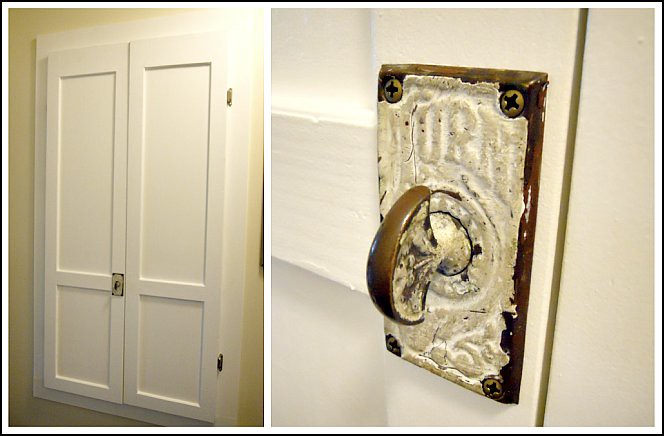
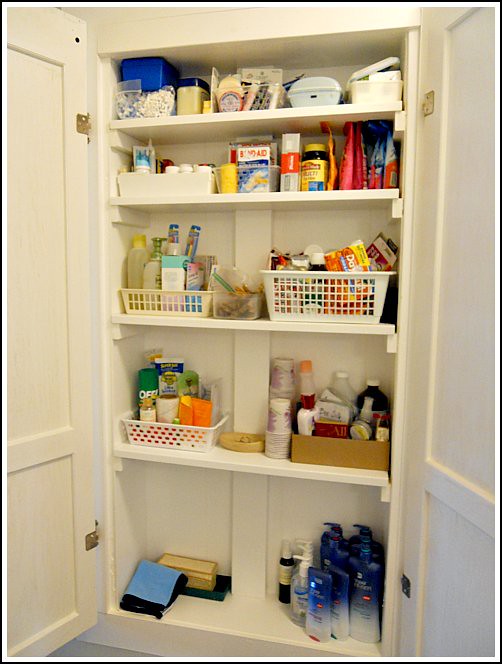
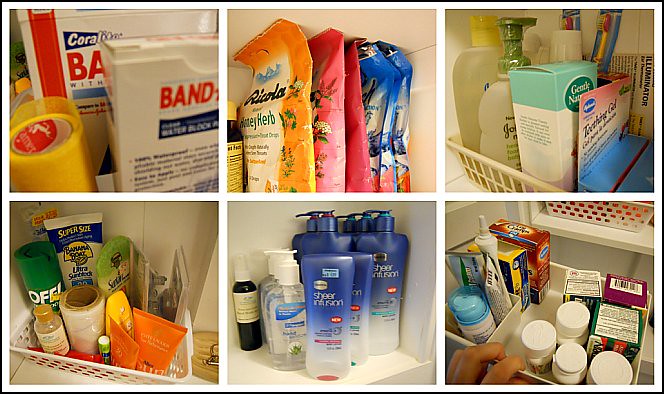
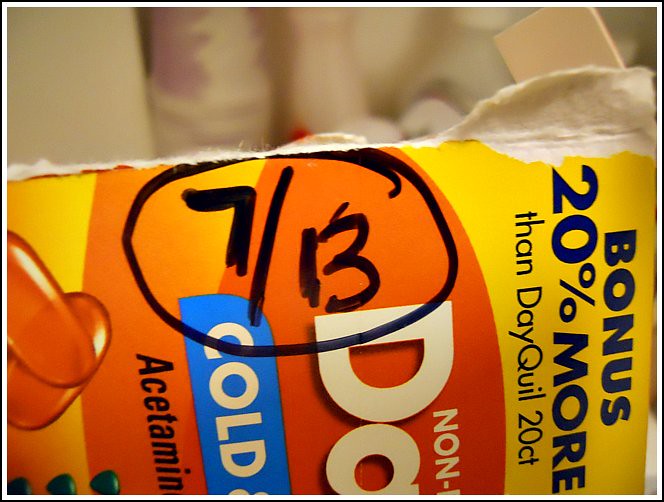
Heather Ratliff says
I just reorganized my first aid kits (including prescription medicines). I used tool boxes that I could put combination locks on. I have 2 young children and I don’t want them to get into them. I wrote the combination on the back of the lock so it’s always there for any adult, but the kids can’t get into it.
Johane says
For the longest time, our medicine was in an upper kitchen cupboard that was too skinny and deep to be of any particular use. Thing is, it got problematic so we moved our medicine to an upstairs closet, where we have our first aid kit.
When my children where much younger, we kept our medicines in a toolbox with a lock and key. Everything from Tylenol to Gravol to teething gel to cold medicine to prescribed medication that did not require refrigeration. It was surely a lifesaver. ADHD kids have very poor impulse control (at the time we did not know that we had ADHD kids…) We were caught on two occasions when we were lax with our medicine control system (due to our own illness). Thankfully, and luckily, there were no serious consequences beyond a worrisome visit to the ER.
One thing that I insist on is that some of our prescribed medicines be bubble wrapped by the pharmacist. Why? For a multitude of reasons. It’s our ADHD medicine, which I need to keep close track of. Having it bubble wrapped allows me to write the dates on the back of the bubble. That way I know right away if someone missed their dose. Since I have teenagers in the house and we often have guests, and the kids go camping with cadets and guides or they go on sleepovers with friends and family, it also allows me to know right away if someone got into something they shouldn’t have. Is this child-proof? No. It’s also kept out of sight and out of reach. I figure if the doctor and pharmacist must keep track of this medication, then I should too. (To be “green”, I have 1 month supply in 1 bubble pack, I just have the pharmacist cross out the “Lunch, Supper, Bedtime” labels with a black marker… At the end of the month I just recycle the cardboard portions of the bubble packs.)
In so far as disposing of medications, when it happens, I just take it to our pharmacist. With a family of 6, a cold medicine barely lasts long enough for 1 bought of cold! lol… Advil and Tylenol? We go through a couple of bottles a year for typical headaches, cramps, and aches & pains. I guess when the kids start to graduate from high school and going off to University we might get smaller bottles of these OTC medicines. Better to get a smaller bottle and replace it more often than have to throw out medicine because it expired. (Tip: Check the expiry dates at the store, sometimes you can get some medicines with later expiry dates…)
Karen @ Abundance on a Dime says
We don’t have much in the way of meds to organize because we really don’t use any 🙂 The only over the counter med I usually have around is a bottle of generic acetaminophen. We do keep some basic first aid supplies on hand of course! We pretty much stick to simple homemade remedies for dealing with colds, etc (I wrote a post about it last fall which you can find here: http://abundanceonadime.blogspot.com/2010/11/seven-natural-and-cheap-ways-to-calm.html )
We are fortunate to have a decent size closet with shelving very much like yours in the upstairs hallway across from the bathroom (a rarity in a nearly 100 year old house!) where we store all our personal care and health related items.
As far as disposing of meds, our local pharmacy will take them for free, and we can also drop them off at our municipality’s hazardous waste disposal depot for free.
Dianne@Baking4Six says
Our house is 2 stories (not by choice) – and we have 4 children and I’ve discovered that it’s best to keep a set of First-Aid supplies upstairs and downstairs – because someone is always up in the middle of the night needing a band-aid, cough drop, or some sort of medicine. Even as my children get older, they still ask me (after I’m in bed) for help with Neosporin or something like that. It can be quite a production in the middle of the night to have to navigate stairs, turn on lots of lights, get what I need, get back upstairs to the child in need (and worse when I discover that I left a light on, or forgot something I needed downstairs – yes, it’s difficult to fully concentrate when you’ve just been woken in the middle of the night).
Even if we had 1 child, I would do this (it’s just that the more children, the more likely/more often someone needs something).
Also sometimes my one tube, or band-aids etc… run out downstairs and at least I have a back-up, up stairs. Kids like to put “empty” boxes back or sometimes, as they get older, forget to put something away because they got distracted and then when it’s needed again, it’s not there – so having a set of essentials in 2 places is helpful.
p.s. I have heard that you should bring them to the RX, too… but I don’t know what they do with them?
Kathy T says
Definitely bring your prescription meds to a pharmacy so they can properly dispose of them. If they go down the toilet they get into the water system, and if they go in the trash/landfill they seep into the soil.
Andrea from Canada says
You can dispose of expired medications through your local pharmacy. Just throw them in a bag, and hand it over to a pharmacist. They know what to do with it. I live in Canada, but I expect the same is true for the States.
goldengirl says
What a great idea! I love this set-up. Thanks for the tip about the expired medications and cat litter. I had not heard of that one.